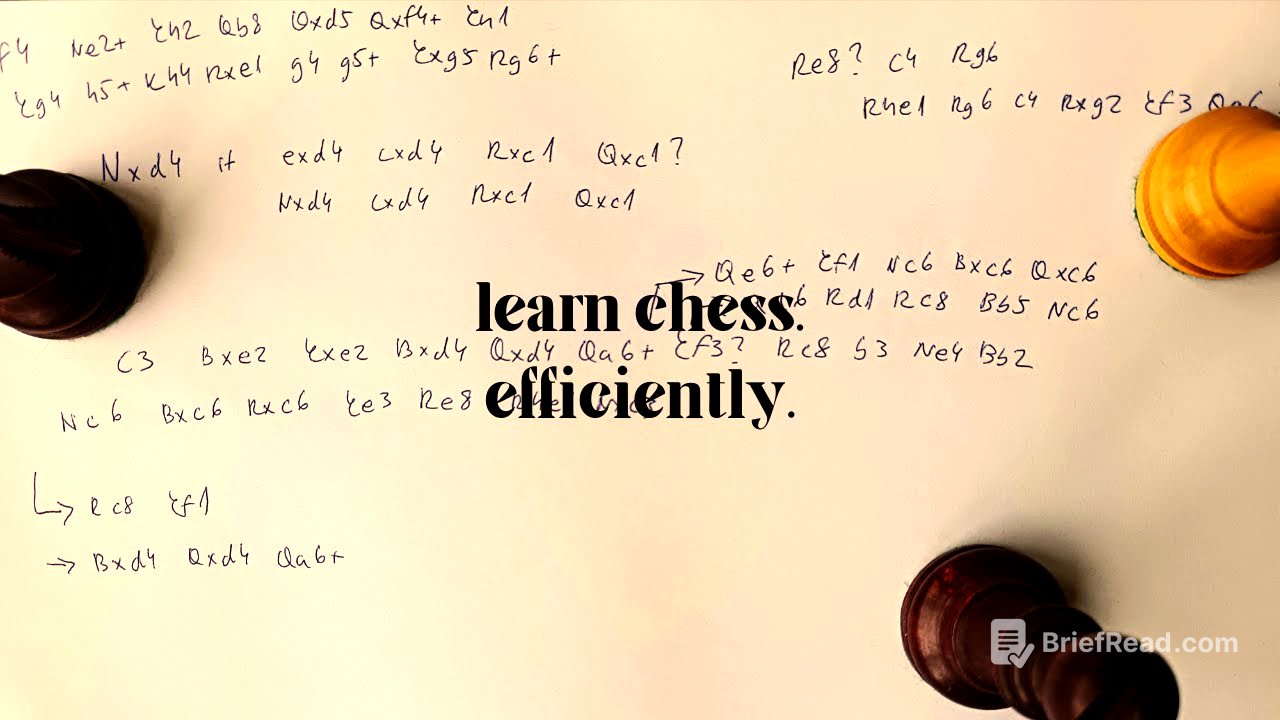TLDR;
In this video, Stephan from Hanging Pawns shares his approach to studying chess effectively, based on his nine years of experience and coaching. He emphasizes a structured, free, and efficient method suitable for adult improvers, focusing on openings, endgames, calculation, strategy, and positional play. The core recommendation involves analyzing games of strong players who share your opening repertoire, thereby integrating all aspects of chess study.
- Focus on practical application over theoretical knowledge.
- Integrate learning across all areas of chess through game analysis.
- Utilize free resources and tools for effective study.
Introduction [0:00]
Stephan discusses his chess journey, highlighting the inefficiencies in his early study methods despite achieving a 2,000 rating. He aims to share a more effective approach to studying chess, drawing from his experience as a player and coach. This method is tailored for adult learners who require structured training to improve, rather than children who benefit more from simply playing tournaments. The video outlines a comprehensive way to learn chess, covering openings, endgames, calculation, strategy, and positional play, all achievable without spending any money.
Finite vs. Infinite Segments of Chess [2:28]
Stephan divides chess study into finite and infinite segments, emphasizing the importance of addressing finite areas like openings and theoretical endgames to clear the path for deeper study in infinite areas such as endgame strategy, calculation, and strategy. He advocates for selecting an opening repertoire and learning it well enough to avoid early blunders, suggesting resources like Lichess, Noctti, and Chessbook for repertoire management. For theoretical endgames, he recommends learning basic concepts like opposition, triangulation, the rule of the square, Lucena position, Filidor position, and basic checkmates, which can be mastered relatively quickly.
Openings Study with Noctti [4:29]
Stephan suggests preparing for opponents during tournaments by reviewing their games and specific lines, rather than rote memorization of openings. He uses Noctti to create and play out repertoires against an AI, which helps in gaining practical experience. Noctti allows users to import their planned openings and play against the AI at various difficulty levels.
Endgames: Theoretical and Complex [6:31]
Stephan divides endgames into theoretical and complex categories. Theoretical endgames are finite and involve learning basic concepts and positions from books, Wikipedia, or YouTube videos. Complex endgames, on the other hand, are infinite and require continuous study.
Infinite Segments: Endgame Strategy, Calculation, and Strategy [7:54]
Stephan addresses the infinite segments of chess study: endgame strategy, calculation, and strategy. He recounts his past unfocused efforts and highlights the critical nature of calculation as a skill that requires constant training. He uses an analogy of rock climbing to illustrate that calculation ability is like a muscle that weakens without regular exercise.
Analyzing Games for Comprehensive Improvement [11:15]
Stephan recommends analyzing games of strong players who play your opening repertoire as the most effective method for improving in endgame strategy, calculation, and strategy. He suggests using free databases like Lichess or chessgames.com to find games of players like Karpov, and analyzing these games without moving the pieces, simulating tournament conditions. After analyzing, compare your analysis with annotations from books to understand the reasoning behind the moves.
Practical Game Analysis Techniques [13:16]
Stephan details his game analysis technique, emphasizing the importance of recreating tournament conditions by analyzing without moving pieces and guessing the moves. He explains how to handle discrepancies between your move choices and the player's actual moves, using examples from his own games. This method integrates opening study, endgame understanding, calculation skills, and strategic decision-making.
Utilizing Annotations and Learning from Strong Players [15:32]
Stephan advises comparing your analysis with annotated games from books, which is like having a coach explain their thought process. He uses David Navara's book as an example, highlighting the benefits of understanding a strong player's reasoning. This approach enhances strategic understanding, endgame technique, opening knowledge, and calculation precision.
Final Recommendations and Utilizing Noctti for Practice [17:43]
Stephan summarizes his recommendations: clear openings and theoretical endgames first, then focus on analyzing games. He suggests using Noctti to play out positions you struggled with during analysis against a human-like AI, which helps in understanding mistakes and improving decision-making. He contrasts this with using a free Lichess engine, noting that Noctti provides more human-like tricks and strategies.
Conclusion [19:57]
Stephan concludes by reiterating the importance of analyzing games in your chosen repertoire, using resources like chessgames.com and annotated game collections. He believes this method develops practical skills rather than just accumulating theoretical knowledge, integrating all aspects of chess into a cohesive learning experience. He encourages viewers to adopt this approach for comprehensive chess improvement.









